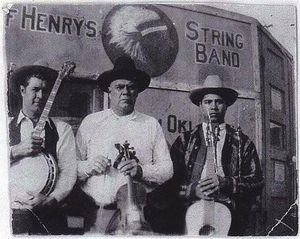Annotation:On the Banks of the Kaney: Difference between revisions
No edit summary |
No edit summary |
||
| (2 intermediate revisions by the same user not shown) | |||
| Line 1: | Line 1: | ||
{{TuneAnnotation | {{TuneAnnotation | ||
|f_annotation='''ON THE BANKS OF THE KANEY.''' American, Two-Step (cut time). C Major. Standard tuning (fiddle). AABB. Big Chief Henry's Indian String Band was the name of the group formed by members of the Hall family: Henry, father, on vocals and fiddle; and sons Clarence on guitar and Harold on banjo. They were Choctaw Indians from Oklahoma, and may have played from a base in Wichita, Kansas, from which they toured Oklahoma and the southeast, and occasionally more distant places, at venues such as county fairs, barrooms, medicine shows and the like. They were 'discovered' at the Mississippi Choctaw Indian Fair at Philadelphia, Mississippi, by H. C. Speir, a music promoter from Jackson, who had them sign with Victor records for six sides, recorded in 1929 in Dallas, Texas. Spier, a businessman who owned a record store in Jackson's predominantly black commercial district, had the entrepreneurial insight to realize that there were a wealth of African-American musicians in his region, and was responsible for signing Robert Johnson, Charlie Patton, Son House, Skip James, the Mississippi Sheiks, and many others to recording contracts (he would record them on aluminum disc records, send them off to various record companies, and negotiated contracts). However, Spier enjoyed white fiddle music as well, and was enthusiastic about Henry Hall's family group. North Carolina banjo player, singer and recording artist Charlie Poole also enjoyed their recordings and opined that they were among his favorites. With the depression and the lack of work, the family moved to the Pacific northwest, where they worked at carpentry<ref>Notes on Henry Hall and his group taken from Fussell, Jake Xerxes, "Out Of This World: Hearing Indigenous And Immigrant Music In The American South" (2013). Electronic Theses and Dissertations. 875. [https://egrove.olemiss.edu/etd/875].</ref>. | |f_annotation=[[File:Bighenry.jpg|thumb|Big Chief Henry's Indian String Band]]'''ON THE BANKS OF THE KANEY.''' American, Two-Step (cut time). C Major. Standard tuning (fiddle). AABB. Big Chief Henry's Indian String Band was the name of the group formed by members of the Hall family: Henry, father, on vocals and fiddle; and sons Clarence on guitar and Harold on banjo. They were Choctaw Indians from Oklahoma, and may have played from a base in Wichita, Kansas, from which they toured Oklahoma and the southeast, and occasionally more distant places, at venues such as county fairs, barrooms, medicine shows and the like. They were 'discovered' at the Mississippi Choctaw Indian Fair at Philadelphia, Mississippi, by H. C. Speir, a music promoter from Jackson, who had them sign with Victor records for six sides, recorded in 1929 in Dallas, Texas. Spier, a businessman who owned a record store in Jackson's predominantly black commercial district, had the entrepreneurial insight to realize that there were a wealth of African-American musicians in his region, and was responsible for signing Robert Johnson, Charlie Patton, Son House, Skip James, the Mississippi Sheiks, and many others to recording contracts (he would record them on aluminum disc records, send them off to various record companies, and negotiated contracts). However, Spier enjoyed white fiddle music as well, and was enthusiastic about Henry Hall's family group. North Carolina banjo player, singer and recording artist Charlie Poole also enjoyed their recordings and opined that they were among his favorites. With the depression and the lack of work, the family moved to the Pacific northwest, where they worked at carpentry<ref>Notes on Henry Hall and his group taken from Fussell, Jake Xerxes, "Out Of This World: Hearing Indigenous And Immigrant Music In The American South" (2013). Electronic Theses and Dissertations. 875. [https://egrove.olemiss.edu/etd/875].</ref>. | ||
|f_recorded_sources=<span>Victor V-40195 (78 RPM), Big Chief Henry's Indian String Band (1929)</span> | |f_recorded_sources=<span>Victor V-40195 (78 RPM), Big Chief Henry's Indian String Band (1929)</span> | ||
|f_see_also_listing=Hear Big Chief Henry's Indian String Band's 1928 recording at Slippery Hill [ | |f_see_also_listing=Hear Big Chief Henry's Indian String Band's 1928 recording at Slippery Hill [[https://www.slippery-hill.com/recording/banks-kaney]] and youtube.com [https://www.youtube.com/watch?v=BgjVuIQXB7Q ] | ||
}} | }} | ||
Latest revision as of 04:49, 7 July 2020
X:1 T:On the Banks of the Kaney N:From the playing of Big Chief Henry's Indian String Band (Ok.) M:C| L:1/8 R:Two-Step D:https://www.slippery-hill.com/recording/banks-kaney D:https://www.youtube.com/watch?v=BgjVuIQXB7Q D:Victor V-40195 (78 RPM), Big Chief Henry's Indian String Band Z:Transcribed by Andrew Kuntz K:C [de]-[ee]|[ee]c2G AE3|G4- G^d- ed|ec2G Ac3|c-B-B2- B2e ed| ec2G AE3|G4 -Gf ff|fd2c Accd|B4- Bf ff|fd2B cdd^d| eecG E^de[de]-|[ee]c2G AE3|G4- GF G^G|AA2A ccd^d| eg3 f3A|cccc dcd^d|e^deg- gec2|Ac2B- BcdB|1c6:|2 c8|| |:Ae2d c3A|cB3 A3^d|e^ded ec2A|cee^d eB=d2| Ae2d c3A|cB3 A3^d|e^ded e=dc2|edcB A4:|]


